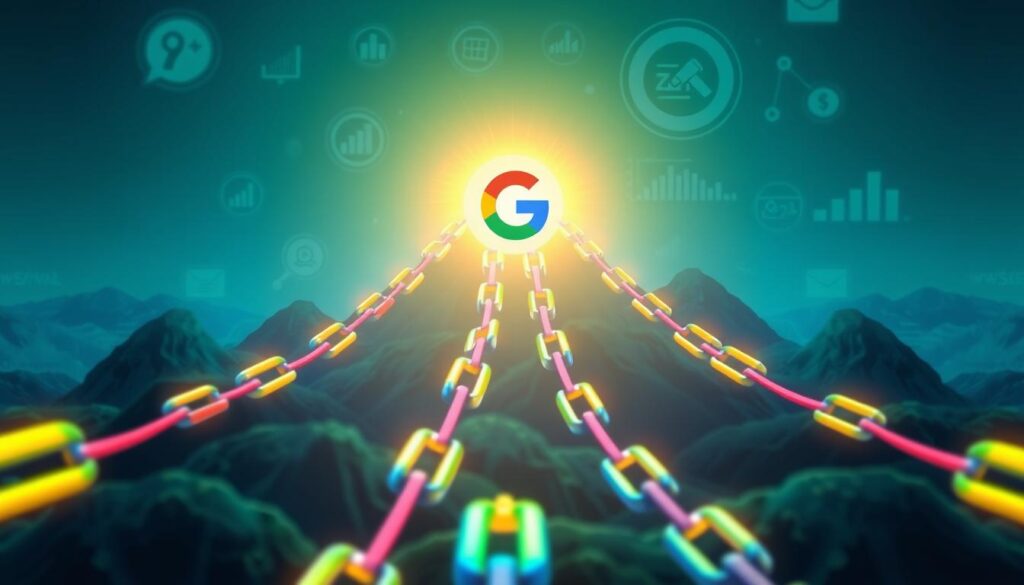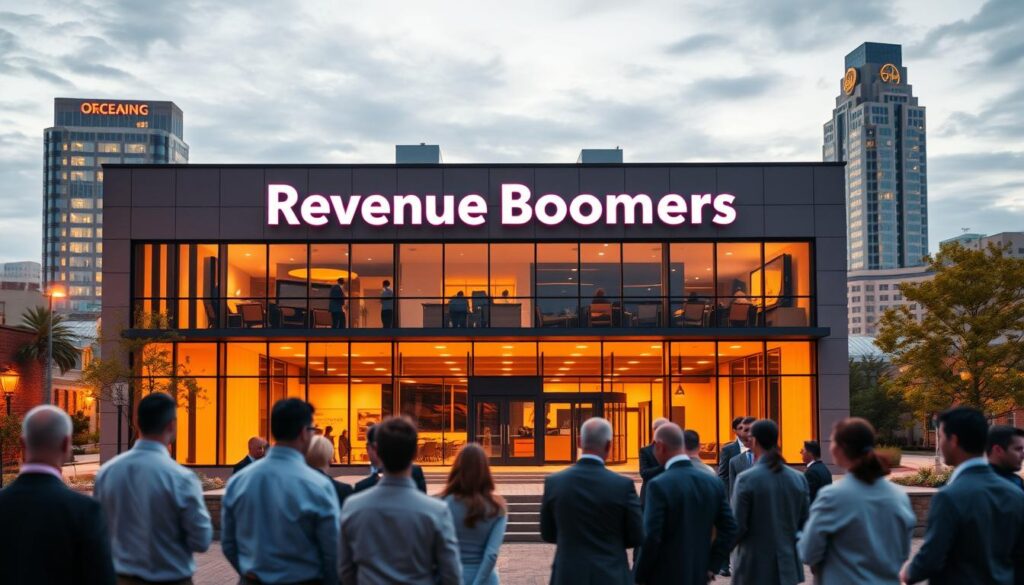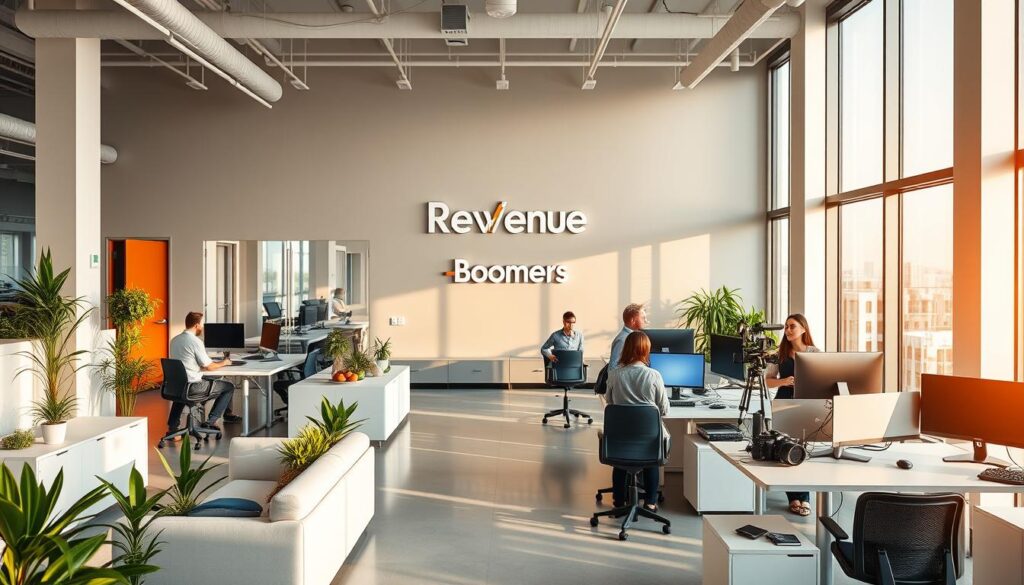Ever wondered why some websites are always at the top of search results? Ranking first on Google is a tough goal. But, with the right strategies, you can improve your website’s ranking and visibility.
In today’s digital world, standing out online is crucial. With millions vying for attention, SEO is a must. This guide will share SEO tips to boost your content’s search engine presence. You’ll learn how to create compelling content and use backlinks effectively.
Key Takeaways
- Achieving first-page placement requires understanding keyword intent and search volume.
- Long-form and high-quality content significantly influences Google rankings.
- Regularly updating your site can enhance its visibility and ranking.
- Reducing bounce rates is crucial for improving user experience and search rankings.
- Utilizing tools like Yoast can make your website more SEO-friendly.
Understanding Google Ranking Algorithms
Google uses complex algorithms to rank web pages. These algorithms check many factors to find the best pages for users. They look at billions of web pages to see if they match what users are searching for.
These algorithms keep getting better, using over 200 signals to rank pages. They look at things like how relevant a page is and how fresh its content is. This helps users find the latest and most accurate information.
Google likes high-quality, original content. It also values expertise, experience, and trustworthiness. Page load speed is important too, as it affects how users experience a website.
To understand Google’s ranking better, it’s good to know about content organization and user satisfaction. Using strategies like topic clusters can help a website rank higher. For more details, check out how Google ranks pages.
Importance of SEO Optimization for Your Website
In today’s digital world, SEO optimization is key for any website to succeed. Google holds about 91% of the search engine market. This means ranking high in search results is crucial. Organic search brings in 53% of all website traffic, showing its importance.
With over 3.5 billion searches on Google daily, the competition is fierce. But, it also means big opportunities for growth. Good SEO can boost your website’s performance, driving more traffic to your main goals. SEO often gives better results than other marketing methods, making it valuable for the long run.

Technical SEO and content optimization are crucial for a better user experience. A well-organized website improves user engagement and search rankings. Publishing quality content, which is 26% of Google’s ranking factors, boosts engagement and relevance.
| SEO Factor | Impact on Ranking |
|---|---|
| Content Quality | 26% |
| Backlinks | 15% |
| Meta Keywords | 17% |
So, focusing on SEO optimization is vital for both short-term and long-term growth. This strategy helps businesses deal with search engine algorithms and strengthens their online presence.
How to Rank First on Google?
To rank first on Google, you need a solid plan. Start with keyword optimization. This means finding the right keywords that match what people are searching for. Use these keywords in your title, headers, and main content.
These spots are key to showing up well in search results.
Strategies for Effective Keyword Optimization
Keyword research is key to SEO success. For top rankings, keep these tips in mind:
- Check keyword difficulty to see how tough it is to compete.
- Make sure your keywords match what users are looking for.
- Choose keywords that are likely to bring in more traffic.
- Use long-tail keywords for better conversion rates, even if they’re searched less.
- Add related keywords to make your content more relevant.
Utilizing On-Page SEO Best Practices
On-page SEO is the base for ranking well. Here are some best practices:
- Put your target keywords in places like title tags, URLs, and headers.
- Create content that’s engaging and informative, aiming for 1,500 to 2,000 words.
- Optimize images and videos with alt text to help search engines understand your content.
- Use structured data markup to make your search results stand out.
- Keep your website fast, aiming for 0-4 seconds to keep users interested.
Following these steps can help you boost your Google ranking. This will make your website more visible and increase click-through rates.
Improve Website Ranking Through Quality Content
Creating quality content is key to better search engine rankings. Focus on making unique content that speaks to your audience. This can lead to more organic traffic. Studies show that good content can increase traffic by up to 50%, showing its importance.
Creating Compelling and Unique Content
Your content should be informative, engaging, and original. Include expert insights and data to boost your authority. A valuable article can get backlinks from other sites, improving your credibility.
Many pages saw better keyword rankings after optimizing their content. Regularly updating your site with fresh content shows search engines you’re active. This can help raise your rankings.
Keeping Content Fresh and Relevant
Keeping your content relevant is crucial for improving website ranking. Regularly review your content to keep it up-to-date with trends and data. Content that’s enhanced can keep users engaged for longer.
Updated articles attract new visitors and keep existing ones interested. This improves user engagement metrics.
| Metric | Before Content Optimization | After Content Optimization |
|---|---|---|
| Organic Traffic Increase | 20% | 50% |
| Average Time on Site | 2 minutes | 4 minutes |
| Bounce Rate | 70% | 40% |
| Conversion Rate | 1% | 5% |
| Click-Through Rate (CTR) Improvements | 3% | 8% |
Investing in quality content can greatly improve your site’s visibility and engagement. For more on effective content strategies, check out the complete guide on ranking higher on.
The Role of Backlinks in Google Search Ranking
Backlinks are key to making your website more visible in search results. Studies show they’re a top ranking factor for Google. Getting links from trusted sites boosts your site’s credibility and authority online.
Building High-Quality Backlinks
Creating a solid backlink strategy is crucial. Aim for quality backlinks over just any links. Here are some ways to get them:
- Guest blogging on popular sites to share your knowledge.
- Working with influencers to promote your content.
- Creating content that people want to share.
- Using the Moving Man Method to update old links.
These methods help build a strong backlink profile. This boosts your domain authority and search rankings.
Understanding the Value of Domain Authority
Knowing about domain authority helps you choose better backlink sites. Links from high-authority sites make your site more credible. It’s important to focus on backlinks that are both relevant and authoritative.
Here’s a comparison of backlink qualities:
| Backlink Type | Authority Level | Impact on Google Ranking |
|---|---|---|
| High-Quality Backlinks | High | Significant boost to search rankings |
| Medium-Quality Backlinks | Medium | Moderate boost to search rankings |
| Low-Quality Backlinks | Low | Minimal or negative impact on search rankings |
Good backlink strategies improve your domain authority. They also help you stand out in the digital market.

Technical SEO: The Backbone of Your Website
Technical SEO is key to your website’s success. It makes your site work better and faster. Site speed and mobile optimization are especially important for user experience and search rankings. Using the right techniques can boost your site’s performance and visibility.
Improving Site Speed and Mobile Optimization
Site speed is a big deal for Google. A quick website keeps users happy and helps your SEO. Here are some tips to make your site faster:
- Optimize images to reduce file sizes without sacrificing quality.
- Minimize server response times by choosing reliable hosting services.
- Leverage browser caching to make use of stored data for faster load times.
- Utilize a Content Delivery Network (CDN) to deliver content efficiently across different geographical locations.
More people use mobile devices than ever before. Mobile optimization is crucial. Google now focuses on mobile performance first. Make sure your site works well on all devices. Check your site’s loading speed, interactivity, and visual stability.
Adding SSL encryption can also help your site’s security and SEO. A technical SEO audit can find problems like broken links and mobile issues. Fixing these problems can make your site faster and more mobile-friendly.

How to Use Meta Tags for SEO Enhancement
Meta tags are key for SEO and greatly affect how search engines and users see your content. Research from Moz shows title tags are second only to content in importance. Making your title tags well-optimized is crucial for better website visibility.
Meta descriptions should be 150-160 characters long to improve search results. They act as a quick summary and can boost click-through rates on search engine results pages.
Here are some best practices for creating effective meta tags:
- Title Tags: Keep them between 50-60 characters, start with target keywords.
- Meta Descriptions: Aim for 105 characters, include clear calls to action.
- Open Graph Tags: Use “og:title” and “og:description” to improve social media content.
- Robots Meta Tags: Control search engine crawling with values like Nofollow and NOINDEX.
- Viewport Meta Tag: Ensure pages look good on all devices by controlling mobile layout.
Alt text tags help search engines understand images, boosting content visibility. Also, using the rel=”canonical” link tag prevents indexing of duplicate URLs, aiding in SEO.
| Type of Meta Tag | Purpose | Best Practices |
|---|---|---|
| Title Tag | Indicates page content to users and search engines. | 50-60 characters, include keywords early, no duplication. |
| Meta Description | Summarizes page content to encourage clicks. | 150-160 characters, clear CTAs, unique to each page. |
| Open Graph Tags | Enhances content appearance on social media. | Utilize og:title, og:description, and og:image. |
| Robots Meta Tag | Controls search engine crawling and indexing. | Use Nofollow, Index, NOINDEX judiciously. |
| Viewport Tag | Controls layout on mobile devices. | Optimize for responsive design across devices. |
Using these elements is key for a good SEO strategy. It helps improve website visibility and user engagement.
Engaging User Experience and Lowering Bounce Rates
Creating a smooth user experience is key to reducing bounce rates. This is important for a site’s SEO. Content must be easy to read, making it essential to structure it well.
Using clear headings, bullet points, and short paragraphs grabs users’ attention. This encourages them to stay longer and interact with the content.
Structuring Content for Readability
Websites should use effective strategies to improve user experience. Here are some important practices:
- Use clear language: Simple phrases help users understand quickly.
- Headings and subheadings: They make content easier to navigate.
- Short paragraphs: Brief paragraphs keep users focused.
- Bullet points: Lists help users quickly scan content.
- White space: Enough space makes content easier to read.
- Consistent design: Familiar colors and fonts make users feel at home.
Displaying important info above the fold and clear calls to action guide visitors. Studies show that good content structure can lower bounce rates to 40% to 60%. Ecommerce sites often do even better, with rates from 20% to 45%.
Tracking Your SEO Progress and Results
Keeping an eye on your SEO performance is key in today’s digital world. It shows how well your optimization plans are working. By checking your metrics often, you can tweak your strategy to boost your site’s visibility and rankings.
Using Analytics Tools for Monitoring
Analytics tools are vital for tracking SEO progress well. Google Analytics, for example, gives detailed data on things like organic traffic and bounce rates. You can see how many people visit your site from search results and how they act once there.
This info helps you compare your site to others and understand the market better. It’s like having a map to guide your SEO efforts.
- Keyword rankings: Keep an eye on your site’s spot in search results, which affects how many people visit.
- SERP visibility: Check how your site shows up on search engine results pages.
- Impressions: See how often your site pops up in search results over time.
- Click-through rate (CTR): Look at how many people click on your site after seeing it in search results.
- Conversions: Find out what actions users take on your site, like subscribing or buying, through Google Analytics events.
- Bounce rate: See how many visitors leave your site without doing anything else, which shows if your content is relevant.
With these tools, you can always keep an eye on your SEO results and make smart choices. Regular checks help you adjust your plans quickly. This keeps your strategies sharp and your site performing well.
Conclusion
Getting to the top of Google takes hard work and a never-give-up attitude. It’s about using smart SEO strategies all the time. Knowing how Google ranks sites, picking the right keywords, and making great content are key steps.
Also, making your site mobile-friendly and fast to load is crucial. These technical SEO tips help a lot in getting better search rankings.
Getting links from other trusted sites is also important. These links boost your site’s authority, helping it rank higher. It’s vital to keep checking and updating your SEO plans to stay ahead in the fast-changing world of search.
For more tips, check out Mobal’s guide. It offers great advice on SEO.
In short, to keep and improve your search rankings, always be ready to adapt and act. Getting help from SEO experts or doing it yourself, focusing on user experience and content relevance is key. This way, you’ll see lasting benefits in your Google visibility.






